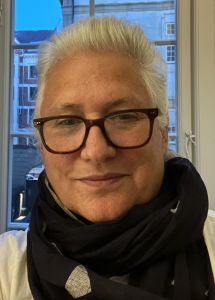The Future of DH at Drew
Please join us on Saturday, September 10, 9:00-5:00, Ehinger Center for the culminating symposium of the Mellon Digital Humanities Grant, “The Future of DH at Drew.” The symposium will be a day-long conversation in which we reflect on what we have done over the past four years and think about the future of the Digital Humanities at Drew. Our hope is that this will be a wide-ranging conversation about the nature and place of the digital humanities in the curriculum, but also about the humanities and the digital more broadly. In the morning faculty, students and alums will present about the work they have done over the past four years. In the afternoon, panelists from three other liberal arts colleges will discuss the ways that their colleges have institutionalized the digital humanities after a Mellon grant. The afternoon will conclude with brainstorming conversations about future possibilities for Digital Humanities at Drew led by the three panelists and members of the DH Advisory Committee. The conference is funded by the Andrew W. Mellon Foundation with support the Office of the Dean of Arts and Sciences.
Please complete this form to register.
Schedule at a Glance
Coffee and Light Breakfast: 8:45 am
Welcome and Opening Remarks: 9:15 am
- Wendy Kolmar, Co-Director, Mellon Digital Humanities Grant
- Jessica Lakin, Provost
Morning sessions: 9:45 am & 11:15 am
Drew Faculty and Students presenting on DHSI and course projects over the past 4 years
Afternoon Panel: 1:15 pm
Introduction, Ryan Hinrichs, Dean of the College of Liberal Arts & the Caspersen School of Graduate Studies
- Alex Gil, Yale University
- Susan Merriam, Bard College
- Mark Sample, Davidson College
Breakout Sessions: 3:00pm
Closing Session and Remarks: 4:00pm
Session and Panel Details
Morning Session 1: 9:45 am
DH as Social Justice/Inquiry
Angella Son (Theological School)
Chuk Obasi (Theatre)
Sandra Jamieson (English)
DH as Pedagogy 1
Leslie Sprout (Music)
Lee Arnold (Art History) & Yi Lu (Math/Computer Science)
Marie-Pascale Pieretti (French) & Nicole Sydor (Class of ’23 French)
Tools & Practices 1: Text Analysis
Carlos Yordan (IR) Jeehae Park (CLA ’25, Pol. Sci.) and Júlia Oliveira Souza (CLA ’25, Pol. Sci./IR)
Wendy Kolmar (English and WGST) & Zack Wolin, (Class of ‘23 English)
Minjoon Kouh (Physics)
Tools & Practices 2: Mapping & Timelines
Lisa Lynch (MCOM)
James Carter (History) Erin Feith (CLA ’21)
Lisa Jordan (ESS)
Morning Session 2: 11:15 am
DH as Research
Lisa Jordan (ESS) James Kalin (Class ‘21, Public Health), Graham Munro-Ludders (Class ‘22, Economics)
Jeremy Blatter (MCOM)
Ziyuan Meng (Math & Computer Science)
Rayne Mostkiewicz (English, CLA ’22)
DH as Pedagogy 2
Kim Rhodes (Art History)
Jens Lloyd (English)
Kristen Turner (Teacher Education)
Tools & Practices 3: Domains of One’s Own
Rebecca Soderholm (Art)
Lee Arnold (Art)
Ann Mills (Business)
Archives/Galleries
Candace Reilly (University Archives) Zoe Bowser (Art History, Studio Art, C’23) and Brynn Goldberg (C’25)
Rita Keane (Art History) Avianna Miller (Studio Art, MCOM,C’23 ) and Maura Kelly (Art History, C’24)
Andrew Salvati (MCOM), Tessa Bagby (CLA ’22), Julia Pietro (CLA ’22)
Shayna Miller, (C’19)
Afternoon Panel 1:15 pm
Alex Gil, Yale University
Susan Merriam, Bard College
Mark Sample, Davidson College

Alex Gil is Senior Lecturer II and Associate Research Faculty of Digital Humanities in the Department of Spanish and Portuguese at Yale University, where he teaches introductory and advanced courses in digital humanities, and runs project-based learning and collective research initiatives. Before joining Yale, Alex served for ten years as Digital Scholarship Librarian at Columbia University, where he co-created and nurtured the Butler Studio and the Group for Experimental Methods in Humanistic Research. His research interests include Caribbean culture and history, digital humanities and technology design for different infrastructural and socio-economic environments, and the ownership and material extent of the cultural and scholarly record. He is currently senior editor of archipelagos journal, editor of internationalization of Digital Humanities Quarterly, co-organizer of The Caribbean Digital annual conference, and co-principal investigator of the Caribbean Digital Scholarship Collective, funded by the Andrew W. Mellon foundation.
Over the past decade, he has been a prolific producer and contributing team member of many recognized digital humanities projects and scholarly software, including Torn Apart/Separados, In The Same Boats and Wax. His scholarly articles have appeared in several essay collections and refereed journals around the world, including Genesis (France), the Canadian Review of Comparative Literature, and Revista de Investigaciones Literarias y Culturales (Venezuela). His forthcoming edition and translation of the lost, original version of Aimé Césaire’s “…..Et les chiens se taisaient” is forthcoming from Duke Press.

Susan Merriam is Associate Professor of Art History and Visual Culture at Bard College and Co-Director of Bard’s Experimental Humanities Center. She has published on experimental humanities and early modern collecting practices and still life painting. Her most recent work in Experimental Humanities is an augmented reality narrative drawing attention to underrepresented histories at Bard’s historic site Montgomery Place (https://eh.bard.edu/projects/augmented-pathways-through-montgomery-place/). She is currently developing the Museum Lab at Montgomery Place, an ongoing experimental research project on the meaning and value of historic sites.

Mark Sample is Chair and Professor of Digital Studies at Davidson College. His teaching and research focus on digital culture, computational creativity, and interactive media. He is the co-author of 10 PRINT CHR$(205.5+RND(1)); : GOTO 10 (MIT Press), and his research has appeared in Game Studies, Debates in the Digital Humanities, Digital Humanities Quarterly, and elsewhere. His most recent work uses the procedural rhetoric of video games to comment on contemporary culture. These projects include the RPG character generator 10 Lost Boys, the workplace horror game Content Moderator Sim, and The Infinite Catalog of Crushed Dreams.